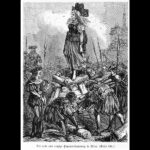Quote:
The [witch] is gone now (…) [but] her fears, and the forces she struggles against in her lifetime, live on. We can open our newspapers, and read the same charges against the idle poor (…). The expropriators move into the Third World, destroying cultures (…) plundering the resources of land and people (…) If we turn on the radio, we can hear the crackle of flames (…) But the struggle also lives on.
Source:
Quote: Silvia Federici (2014: 208).
Picture: Wikimedia. The picture from 1880 shows Elisabeth Plainacher who was executed as an alleged in 1583 in Vienna.
Author Bio:
Starhawk (born 1951 as Miriam Simos) is an US American writer and activist. She writes feminist non-fiction books that centre on goddess religions.
Context:
 Starhawk is referring to the persecution of women as witches in the context of capitalism’s seizure of the commons in Europe, which began in the 14th century. She sees parallels between on the one hand, the devaluation in Europe of women’s ways of life, work and knowledge during capitalism’s rise, and on the other, the categorisation as inferior of societies in the Global South, as well of poor people today. Resistance by these actors has always stood in the way of capitalist exploitation of humans and nature.
Starhawk is referring to the persecution of women as witches in the context of capitalism’s seizure of the commons in Europe, which began in the 14th century. She sees parallels between on the one hand, the devaluation in Europe of women’s ways of life, work and knowledge during capitalism’s rise, and on the other, the categorisation as inferior of societies in the Global South, as well of poor people today. Resistance by these actors has always stood in the way of capitalist exploitation of humans and nature.Further Reading:
Silvia Federici (2014): Caliban and the Witch. Women, the Body and Primitive Accumulation. New York: Autonomedia.
Year:
1982